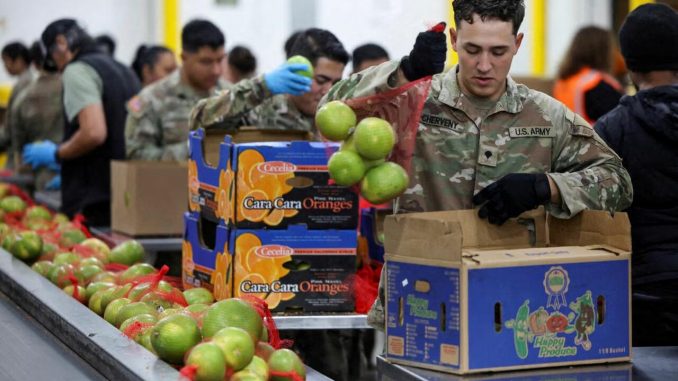
National Guard Troops in California were deployed to support food pantries as millions of Americans braced for an end to SNAP Funding during the government shutdown
Published October 31, 2025
A federal judge in Massachusetts seemed sympathetic to the arguments made by 25 Democratic state leaders during an emergency hearing over the SNAP benefits
SNAP Benefits Crisis: Court Orders Bring Temporary Relief Amid Shutdown Uncertainty
As the U.S. government shutdown enters another week with no clear end in sight, millions of American families are caught in the crossfire — not of politics, but of hunger. The Supplemental Nutrition Assistance Program (SNAP), which helps feed over 42 million people, has become the focal point of a nationwide crisis, as the U.S. Department of Agriculture (USDA) warns it may run out of funds to continue benefits.
Food banks are already seeing a surge in demand as recipients brace for potential interruptions, while federal judges are stepping in to prevent what could become one of the largest social disruptions of the decade.
1. How the Shutdown Triggered the Crisis
When Congress failed to pass a new spending bill on October 1, 2025, federal agencies entered shutdown mode. The USDA, which oversees SNAP, immediately faced the challenge of operating without appropriations. Although the department holds roughly $5 billion in contingency funds, officials initially stated these reserves could not legally be used for regular monthly benefits.
That interpretation sparked outrage among state leaders, anti-hunger organizations, and recipients who rely on SNAP for survival. Twenty-five states and the District of Columbia filed lawsuits demanding that the administration release emergency funds to sustain the program. The plaintiffs argued that the USDA had both the authority and moral obligation to prevent millions from going hungry.
2. Dual Court Rulings Against the Suspension
On October 31, two federal judges — Judge Indira Talwani in Massachusetts and Judge John McConnell in Rhode Island — ruled that the administration must use available contingency funds to continue SNAP payments.
-
Judge Talwani’s ruling declared the attempted suspension of benefits “likely unlawful,” emphasizing that abrupt termination would cause “irreparable harm” to low-income households.
-
Judge McConnell’s decision went further, ordering the USDA to immediately deploy emergency funds and maintain all work-requirement waivers that protect vulnerable groups such as seniors and veterans.
These rulings collectively forced the administration to find a way to keep benefits flowing, at least temporarily. The decisions also reinforced the judiciary’s authority to intervene when political stalemates threaten basic welfare programs.
3. The Scale of the Fallout
SNAP is more than a line item in the federal budget — it’s a lifeline. Every month, the program helps one in eight Americans buy groceries. With over 42 million participants, even a single missed payment would ripple through local economies, grocery chains, and social-service networks.
Food banks nationwide have reported sharp increases in visitors since the USDA’s warning. According to a ZeroHedge report, some facilities saw food runs within days of the announcement. Nonprofit directors describe scenes reminiscent of the early pandemic: long lines, empty shelves, and desperate families unsure when they’ll receive help again.
Economists warn that if SNAP payments stop, the impact could extend beyond households. Reduced consumer spending on food could hurt local businesses and trigger higher demand for charitable aid — an unsustainable cycle.
 Implications
Implications
-
Temporary Relief for Millions:
The court orders provide short-term stability for roughly 42 million Americans who depend on SNAP to afford food. However, these rulings only delay a crisis if the shutdown continues. -
Legal Precedent for Future Shutdowns:
The twin rulings set a powerful precedent — courts can compel the executive branch to release contingency funds for essential aid programs during funding lapses. This may redefine how “mandatory” programs are treated in future shutdowns. -
Fiscal Strain on USDA:
Using contingency funds to cover regular benefits could drain resources meant for genuine emergencies, leaving less flexibility if natural disasters or crises strike while the shutdown continues. -
Political and Administrative Pressure:
The rulings intensify pressure on both Congress and the administration to reach a budget deal. Politically, it places accountability on leaders to balance fiscal responsibility with humanitarian needs. -
Food Security and Public Trust:
The mere threat of halted benefits has already driven runs on food banks, revealing how fragile America’s food security network is. It also damages public trust in the government’s ability to protect vulnerable citizens during political standoffs. -
Long-Term Policy Debate:
Lawmakers may need to revise SNAP’s funding structure — possibly separating it from annual appropriations or defining contingency fund access more clearly — to prevent future shutdown-induced food insecurity.
 Overall Takeaway:
Overall Takeaway:
As the government shutdown drags on, the battle over SNAP funding exposes more than just a budgetary dispute — it highlights the deep tension between fiscal governance and social responsibility. The twin court rulings against the administration offer temporary relief, ensuring that millions of Americans will continue receiving food assistance, but they also reveal how fragile the system is when politics override planning.
While federal judges have stepped in to keep benefits flowing, the reliance on contingency funds is not sustainable. Unless lawmakers reach a budget deal soon, both state agencies and struggling families face renewed uncertainty. The outcome of this standoff could shape not only how SNAP operates during future shutdowns but also how the nation defines “essential” services in times of political gridlock.
In the end, this episode underscores a simple truth: food security should not depend on the next spending bill or court injunction. It’s a reminder that behind every policy battle are real people — families, veterans, seniors, and children — whose next meal hangs in the balance.
SOURCES: ZEROHEDGE – Oh SNAP: Judges Order Trump Admin To Use Emergency Funds For Food Assistance
FOX NEWS – Two judges rule Trump admin must keep SNAP benefits in place as shutdown drags on
DAILY PRESS – Judges order the Trump administration to use contingency funds for SNAP payments during the shutdown
STRAIGHT ARROW NEWS – Judges rule that Trump admin must fund SNAP benefits during shutdown





Be the first to comment